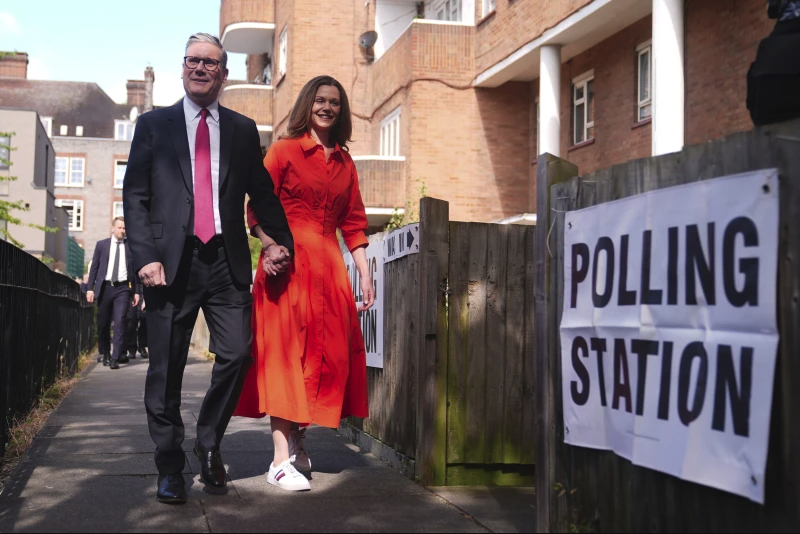
Published 07/04/2024 18:42 | Edited 07/04/2024 19:11
The United Kingdom held its first national election in almost five years on Thursday (4), with exit polls showing that Prime Minister Rishi Sunak’s Conservative Party will be punished for failing to fulfill the promises made during 14 years in power. The numbers reveal a landslide victory for the Labor Party, which would now have a majority in Parliament. The result is expected to take some time to come out, as on the Island, people still vote by putting an X on the paper.
Prime Minister Rishi Sunak leads his Conservative Party, facing a devastated political landscape. His main opponent is Keir Starmer, who has led the Labour Party since April 2020. This time, the Labour Party is set to return to power for the first time after a long agony of watching helplessly as the United Kingdom left the European Union, in addition to the dismantling of the public health system, the jewel in the crown, created by progressive forces.
Exit poll suggests Labour won 410 seats and the Conservatives 131
Conservatives: 131, loss of 241 seats
Work: 410, gain of 209 jobs
Liberal Democrats: 61, up 53
SNP: 10, loss of 38
UK Reform: 13, gain of 13
Plaid Cymru: 4, mais 2
Greens: 2, won another one
“To everyone who campaigned for Labour in this election, to everyone who voted for us and put their trust in our new Labour Party – thank you,” Keir Starmer said at X. “The numbers are encouraging, but an exit poll is a poll, so we don’t have any results yet,” said Labour deputy leader Angela Rayner.
Labour has probably secured its expected landslide victory, although it may have fallen short of the majority won by Tony Blair in the 1997 general election. This was after being humiliated and reduced five years ago to its lowest number of seats since 1935. Boris Johnson, just two years ago, was publicly musing about winning three terms in office until the 2030s.
But the party could also achieve this with a smaller share of the vote than former leader Jeremy Corbyn achieved in 2017.
Tomorrow lunchtime, the UK will have its fourth prime minister in less than two years. But the new government will face all the same old problems that caused its predecessor so much trouble: the cost of living, government finances, the tax burden, a dangerous world. Starmer has promised to revive the economy, invest in infrastructure and fix the NHS.
The far-right reformists who had nothing won 13 seats, revealing electoral volatility, in which more people in more places are more willing to change their minds more often and more quickly about politics than ever before.
Participation and results
Polls close at 10pm (4pm GMT), and exit polls were due to be released shortly after. However, people were still voting after the scheduled time. One of the significant unknowns in the UK election is how turnout will influence the outcome. The number of people who voted will not be known until after the polls close.
The UK has 67 million residents, and 46 million were registered to vote in the last general election in 2019, with a turnout of 67%. In local elections in May, the Conservatives suffered heavy losses in council seats and mayoral offices, with an average turnout of 30%, according to the Institute for Government, an independent think tank.
The Conservatives were optimistic that the high turnout reported on Thursday could help them overcome polls suggesting a sweeping Labour victory. On the other hand, with a double-digit lead in the polls ahead of Election Day, Labour fears supporters will become complacent and not vote, urging everyone to turn out.
NHS crisis and economic challenges
The crisis in the National Health Service (NHS) shows why the Conservatives are struggling after 14 years in power. Health policy experts say the Conservative government has failed to fund the NHS adequately, resulting in serious problems. The NHS is stretched thin by a growing and ageing population, years of funding constraints and the fallout from the Covid-19 pandemic.
Some 52% of people were dissatisfied with the NHS last year, a rise of 29 percentage points since 2020, according to the British Social Attitudes Survey. In addition, the cost of living crisis remains a problem in the UK. The economy had barely recovered from Covid-19 before being hit by a global spike in energy and food prices, largely triggered by Russia’s invasion of Ukraine.
Campaign messages
Since calling the general election, Sunak has been repeating an optimistic message: “The economy is turning the corner. Inflation is low. Things are getting better.” However, that is not the reality for millions of people in the UK who are still feeling the pressure of high food, energy and housing prices.
The cost of living crisis is a key concern for voters in this parliamentary election. Although inflation has returned to near-normal levels, energy bills and shop prices are still high. And while wages are starting to rise, mortgages and rents have soared along with interest rates, significantly reducing the income of many families.
In addition to the economic challenges, the UK’s ageing infrastructure, from schools and hospitals to potholed roads, is a constant concern. Water quality has also been a significant issue, with numerous waterways contaminated by sewage.
Labor leadership
Some disillusioned voters have turned to the populist Reform Party, led by Nigel Farage. Farage, known for his Brexit campaign, has attracted a growing number of Conservative voters with his promise to “take our country back”. He has come from nowhere to win 13 seats, beating the Scottish National Party (SNP), which lost 38 seats. This makes him the fourth-largest political force in Parliament.
John Swinney, leader of the Scottish National Party, has struggled to stem the tide of support from the rival Labour Party in Scotland. Swinney has promised to seek Scottish independence talks if his party wins a majority of seats in Scotland.
Source: vermelho.org.br

